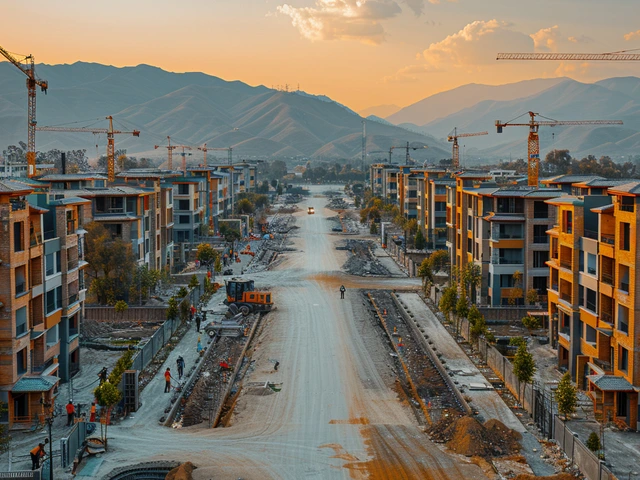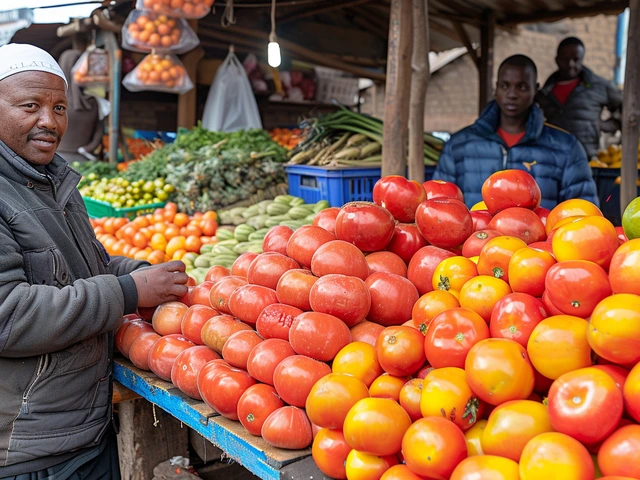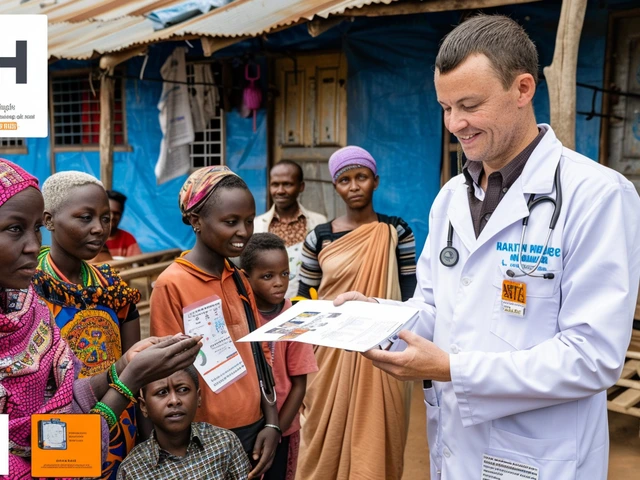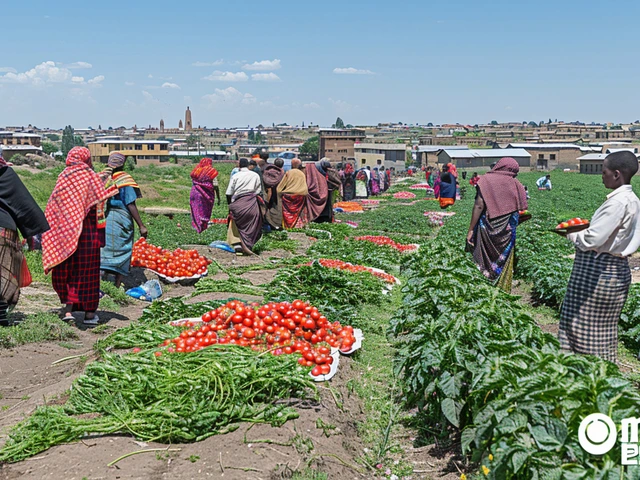Ethiopia's Economic Indicators
Ethiopia, with a population of over 110 million, is the second-most populous country in Africa. Despite its rich cultural heritage and abundant natural resources, Ethiopia has long been associated with poverty and economic struggles. According to the World Bank, Ethiopia's Gross National Income (GNI) per capita stood at $850 in 2021, placing it in the low income category. This figure is significantly lower than the global average and highlights the nation's economic challenges.
However, it's important to note that Ethiopia has made significant strides in recent years. The country has experienced rapid economic growth, with an average annual GDP growth rate of around 9% between 2010 and 2019. This growth has been driven by investments in infrastructure, agriculture, and manufacturing. The government has also implemented policies aimed at attracting foreign investment and promoting exports.
Despite these positive developments, Ethiopia still faces significant economic hurdles. The country's economy is heavily dependent on agriculture, which employs over 70% of the population. However, agricultural productivity remains low due to factors such as limited access to modern farming techniques, inadequate infrastructure, and frequent droughts. As a result, many Ethiopians continue to live in poverty, with limited access to basic services such as healthcare and education.
Poverty and Human Development in Ethiopia
Poverty remains a pervasive issue in Ethiopia. According to the United Nations Development Programme (UNDP), about 24% of Ethiopians live below the national poverty line. This means that nearly a quarter of the population struggles to meet their basic needs, such as food, shelter, and clothing. Poverty is particularly acute in rural areas, where access to essential services and economic opportunities is limited.
Ethiopia also faces challenges in terms of human development. The country ranks 173 out of 189 countries on the Human Development Index (HDI), which measures key dimensions of human development such as life expectancy, education, and standard of living. Ethiopia's HDI value for 2019 was 0.485, which is below the average for countries in the low human development group.
"Ethiopia has made commendable progress in reducing poverty and improving living standards over the past two decades. However, sustaining this progress requires continued efforts to address the root causes of poverty, such as limited access to education, healthcare, and economic opportunities." - Dr. Abebe Aemro Selassie, Director of the African Department at the International Monetary Fund (IMF)
The Ethiopian government has recognized the need to address these challenges and has implemented various initiatives aimed at reducing poverty and promoting human development. For example, the government has invested in education, with a focus on increasing enrollment rates and improving the quality of education. It has also launched programs to expand access to healthcare, particularly in rural areas.
Recent Economic Developments and Outlook
Despite the challenges, there are reasons for optimism about Ethiopia's economic future. The government has launched ambitious development plans, such as the Growth and Transformation Plan (GTP) II, which aims to transform Ethiopia into a middle-income country by 2025. The plan focuses on industrialization, infrastructure development, and export promotion.
Ethiopia has also made significant progress in attracting foreign investment. The country has established industrial parks and special economic zones to encourage investment in manufacturing and other sectors. Major international companies, such as PVH Corp (Calvin Klein, Tommy Hilfiger) and H&M, have set up operations in Ethiopia, drawn by the country's low labor costs and strategic location.
| Year | GDP Growth Rate |
|---|---|
| 2018 | 6.8% |
| 2019 | 9.0% |
| 2020 | 6.1% |
| 2021 (projected) | 2.0% |
However, Ethiopia's economy has not been immune to the impact of the COVID-19 pandemic. Like many countries around the world, Ethiopia has experienced economic disruptions due to lockdowns, reduced trade, and decreased foreign investment. The IMF projects that Ethiopia's GDP growth rate will slow to 2.0% in 2021, down from 6.1% in 2020.
Despite these short-term challenges, the long-term outlook for Ethiopia's economy remains positive. The government's commitment to economic reforms, infrastructure development, and human capital investment bodes well for the country's future. As Ethiopia continues to attract foreign investment and develop its manufacturing and service sectors, there is potential for significant economic growth and poverty reduction in the coming years.
In conclusion, while Ethiopia currently falls into the category of a low income country, it has made significant progress in recent decades. The government's focus on economic growth, poverty reduction, and human development has yielded positive results, although challenges persist. With continued efforts to address these challenges and capitalize on the country's potential, Ethiopia has the opportunity to transform its economy and improve the lives of its citizens in the years to come.

 Why Are Houses So Expensive in Ethiopia? A Comprehensive Look at the Factors Driving High Property Prices
Why Are Houses So Expensive in Ethiopia? A Comprehensive Look at the Factors Driving High Property Prices
 Understanding the Average Salary in Ethiopia: An In-depth Analysis
Understanding the Average Salary in Ethiopia: An In-depth Analysis
 Leading Causes of Death in Ethiopia: A Detailed Overview
Leading Causes of Death in Ethiopia: A Detailed Overview
 Why Ethiopia Stands Out: Unique Aspects of an Exceptional African Nation
Why Ethiopia Stands Out: Unique Aspects of an Exceptional African Nation
 Top-Earning Jobs in Ethiopia in 2024: A Comprehensive Guide
Top-Earning Jobs in Ethiopia in 2024: A Comprehensive Guide
Abhijit Pimpale
April 6, 2024 AT 03:46Ethiopia's GNI per capita of $850 indeed places it in the World Bank's low‑income bracket, as defined by the $1,045 cutoff for 2021.
Eric DE FONDAUMIERE
April 6, 2024 AT 05:43Wow, the numbers look tough but don’t lose hope! Ethiopia’s growth rate of around 9% before the pandemic shows it can bounce back faster thn many economies. With the GTP II plan, foreign direct invesment can keep flowing, givng jobs to millions. Let’s keep an eye on the agriculture reforms – they’re key to lifting the 24% in poverty. The next few years could bring a real shift if policies stay on track.
Pauline Herrin
April 6, 2024 AT 07:40While the article presents a thorough overview of Ethiopia’s macro‑economic indicators, it glosses over the structural impediments that have persisted despite impressive headline growth rates. The reliance on low‑productivity agriculture, coupled with recurrent droughts, continues to anchor a substantial share of the labor force in subsistence activities, thereby limiting the multiplier effects of infrastructure investments. Moreover, the human development metrics, notably the HDI ranking of 173, underscore systemic deficiencies in health and education that are not readily remedied by capital inflows alone. A more nuanced analysis would differentiate between growth‑led income gains and inclusive development outcomes.
pradeep kumar
April 6, 2024 AT 09:53These so‑called “optimistic projections” ignore the chronic governance deficits that erode investor confidence and stall reforms.
love monster
April 6, 2024 AT 12:06The trajectory of Ethiopia’s economy can be mapped through a series of interlocking value chains that, if properly catalyzed, could transition the nation from a low‑income to a middle‑income status.
First, the manufacturing sector, anchored by the newly established industrial parks, is poised to generate economies of scale that will reduce unit costs and attract tier‑one OEMs.
Second, the agritech diffusion pipeline-encompassing precision farming, input subsidies, and market linkage platforms-addresses the productivity gap that has historically constrained rural output.
Third, the financial inclusion drive, leveraging mobile money ecosystems, expands credit access for MSMEs, thereby fostering a more resilient entrepreneurial base.
Collectively, these levers form a synergistic framework often described in development economics as a ‘growth dividend’ that can be reinvested into human capital.
From a policy perspective, the Growth and Transformation Plan II provides a strategic blueprint that aligns fiscal stimulus with structural reforms, a prerequisite for sustainable growth.
The IMF’s projection of a 2 % GDP growth rate in 2021, while modest, should be interpreted as a baseline scenario that can be outperformed with targeted sectoral interventions.
In practice, the COVID‑19 shock highlighted the need for supply‑chain resilience, prompting the government to diversify export baskets beyond traditional commodities.
The recent inflow of multinational apparel firms signals an emerging competitive advantage in labor‑intensive manufacturing, provided that workforce upskilling keeps pace.
Education reforms, especially in STEM curricula, are essential to supply the technical talent required for both high‑tech and advanced manufacturing nodes.
Healthcare investments, such as expanding primary care networks, will improve labor productivity by reducing disease burden, an often‑overlooked factor in growth models.
Furthermore, climate‑smart agriculture initiatives can mitigate the adverse effects of drought, securing food security and stabilizing rural incomes.
The ongoing decentralization of fiscal authority to regional administrations also empowers local governments to tailor development projects to specific demographic needs.
External financing mechanisms, including blended finance and development bonds, can bridge the infrastructure financing gap without over‑leveraging sovereign debt.
In summary, the confluence of industrial policy, agrarian reform, financial inclusion, and human capital development creates a multidimensional growth engine for Ethiopia.
If these components are orchestrated effectively, the nation stands a realistic chance of crossing the low‑income threshold within the next decade.